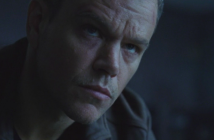
Editor’s Notes: Jason Bourne opens today in wide theatrical release.
When Matt Damon, returning after a nine-year hiatus to his signature role, Jason Bourne, the onetime amnesiac, super-soldier, and government assassin, whisper-shouts, “It ends tonight,” to no one in particular moments before the fifth entry in the series, Jason Bourne, and the fourth with Damon, kicks back into the chaotic action mode director Paul Greengrass popularized more than a decade ago, it’s both functionally true within the fourth film’s narrative and untrue outside the film. To say it never ends might be going too far, but it’s certainly not going to end with the fifth film, not if moviegoers embrace the re-contextualized Bush-era hero again. Chances are, they will, in part thanks to the gravitational pull of nostalgia, but also in part because moviegoers and the action genre are made for each other. Add Matt Damon, an Oscar-nominated (and winning) A-level actor with a recent critically well-received, box-office hit, The Martian, to the (re)mix and Jason Bourne: The Movie seems a surefire commercial success.
Jason Bourne: The Movie repeatedly contrasts Bourne’s kinder, gentler approach to violent confrontations.
Jason Bourne finds the title character drifting through Greece, scraping a living as a fighter in underground matches (except they’re aboveground, outside, in the dirt). He’s managed to live off the grid since we last saw him, but his old CIA associate turned anti-government hacker, Nicky Parsons (Juliet Stiles), discovers troubling evidence involving Bourne’s late father and the now defunct Treadstone super-soldier program, she forces Bourne to meet her in Athens during an anti-austerity demonstration. The demonstration quickly turns into a dangerous confrontation between demonstrators and the police, conveniently giving Greengrass the first of several opportunities to return his brand of chaos cinema back into literal action. A tense walk-and-talk turns into an extended chase scene involving Bourne, Parsons, and a CIA operative, the “Asset” (Vince Cassel), with a personal grudge against Bourne.

Jason Bourne: The Movie repeatedly contrasts Bourne’s kinder, gentler approach to violent confrontations. Time and again, he’ll disable opponents, maybe injuring them in the process, but never seriously and never fatally. In comparison, the Asset kills without hesitation or reluctance. He’s Bourne’s dark reflection, a corrupted mirror image that leaves a remarkably large body count wherever he goes, including other CIA agents, repeatedly ignoring the usual protocols regarding stealth and non-detection. That he gets away repeatedly has less to do with his skills as an assassin and everything to do with Greengrass’ credibility stretching screenplay, a screenplay that effortlessly segues from logic to nonsense to absurdity (and back again), often in the same scene. Bourne can still do everything, of course: Operate any kind of vehicle, often while wounded, escape repeatedly from spectacular car crashes with just a few bumps and bruises, to live and fight another day (i.e., another entry in the series).
Forced contemporary relevance aside, Greengrass seems content to hit the familiar beats that made the earlier entries in the series so popular . . .
Following the blueprint laid out by the earlier entries, Jason Bourne: The Movie also sets Bourne against another, more powerful antagonist, Robert Dewey (Tommy Lee Jones), the current CIA director. Dewey not only has the best big-screen surveillance monitors government money can buy (the better to spy on everyone), he has a cozy business relationship with a Mark Zuckerberg-inspired tech billionaire, Aaron Kalloor (Riz Ahmed). Kalloor’s social media platform, Deep Dream (Facebook), dominates the space, boasting more than a billion users worldwide. While Kalloor begins to rethink his deal with Dewey, Dewey pressures him to give the federal government complete and unfettered access. In short, it’s the nightmare of every civil libertarian, left or right, but for a series seemingly desperate to prove itself relevant in the waning days of the Obama administration, it doesn’t just feel like we’ve seen it before. We’ve seen it before (see, e.g., Captain America: The Winter Soldier two years ago).
Forced contemporary relevance aside, Greengrass seems content to hit the familiar beats that made the earlier entries in the series so popular, from Bourne once again seeking existential answers (not the who, but the why), a female character/potential romantic interest shelved (or fridged) forty minutes into Jason Bourne’s running time, swapping out one fungible female character, Parsons, for another, Heather Lee (a too young, slightly miscast Alicia Vikander), a CIA cyber-security expert with a hidden agenda or two in her pocket, and the big, spectacle-driven set pieces (e.g., a motorcycle vs. car(s) chase here, a close-up, bone-breaking fight there), a corrupt, unaccountable bureaucrat (usually played by a respectable, slightly slumming character actor), a shocking/not-shocking revelation involving Bourne’s murky past, and an optimistic open-ended, sequel-ready denouement. In the end, though, Jason Bourne: The Movie never feels like it’s more than the sum of its all-too-familiar parts, probably because it isn’t.
In the end, though, Jason Bourne never feels like it’s more than the sum of its all-too-familiar parts, probably because it isn’t.



